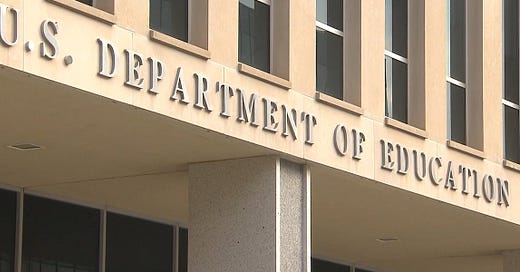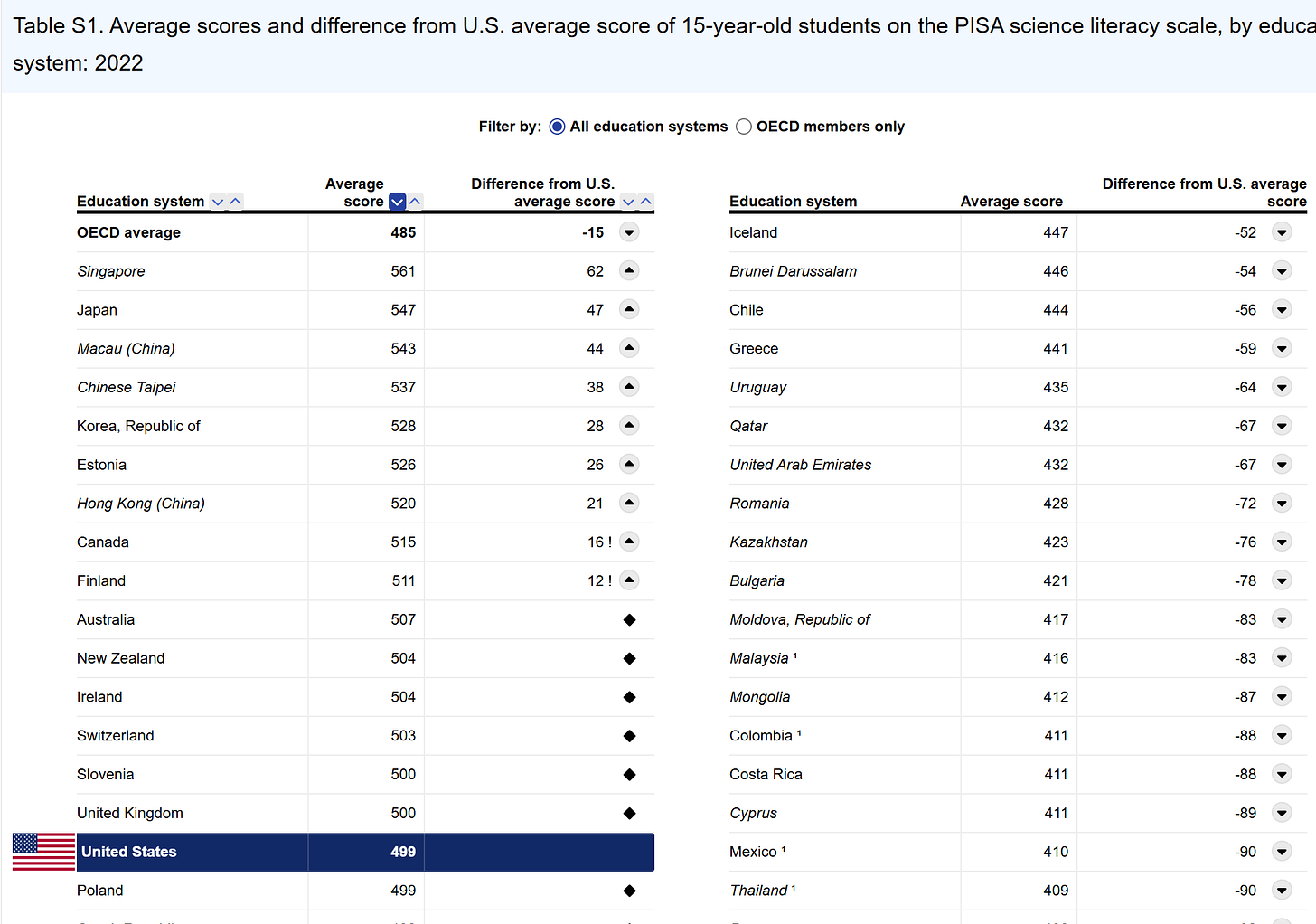A few weeks ago, the Good Science Project newsletter discussed many ill-advised cancellations of education contracts by DOGE, including everything from randomized trials of reading programs, to the national statistics on how US students are performing.
At the time, I chalked it up to the naivety of young folks at DOGE, unwittingly cancelling items that they just didn’t understand quite yet. After all, the DOGE folks have little or no experience in government, and often seem to be unfamiliar with what they are even looking at. While they have cancelled a few frivolous grants or contracts, the track record so far is mixed at best.
It’s as if someone showed up to your household to reduce waste, and after a few weeks, reported back:
I cancelled your subscriptions to Disney+, Vogue Magazine, and DoorDash. [ok fine. so far, so good!]
Next, I cancelled your water bill, which will save you $100,000 per month [wait, what? that is off by a factor of 1,000. also my household does need to have water.].
You were spending way too much on babysitters, pediatricians, and dentists, so I gave notice that their services are no longer needed. [hold on, those are necessary]
There was also this big blocky thing downstairs that was using a ton of electricity—very wasteful! I sold it for scrap metal to a junkyard owner. He claimed it was a “refrigerator”? Not sure what that means, but it seems like fraud. [you sold my refrigerator?!]
Finally, I chopped down an unnecessary “staircase” to use for firewood. In the meantime, you can use this climbing rope to get upstairs.
By the way, if you object to any of this, it can only be because you were benefiting from all the fraud and abuse.
The ideal of DOGE is wonderful, and is something that the Good Science Project has promoted since the beginning. The reality of DOGE thus far is to cut a few items that were arguably frivolous, while also cutting some useful expenditures (such as Ebola screening) and workers (e.g., nuclear safety or people who investigate firefighter deaths or IRS agents who pay for themselves and everyone else), while exaggerating any savings.
***
Up till now, I assumed that the cancellations of education contracts were unwitting.
But the past few days have made all of these cancellations seem witting.
As of this week, the Institute of Education Sciences (including the National Center for Education Statistics) has been essentially wiped out.
I first noticed when I saw these posts on LinkedIn.
And now it has been confirmed by Science.
As well as ABC News:
People at IES were responsible for collecting basically every fact and statistic that we know about US education. Have you ever seen charts like this, tracking educational performance since 1971 across the US?
That was the work of IES.
Or maybe you’ve seen charts like this, tracking US performance in science against other countries:
Also handled by IES.
IES has been doing all of that, and much more.
Are the current firings just part of an anti-Department-of-Education stance? Probably so.
But the role of collecting national statistics is nearly 160 years old!
Yes, the US Department of Education (as a cabinet agency) started at the end of President Carter’s term.
But the federal role in education actually started in 1867 under President Andrew Johnson. The entire point was to “collect[] such statistics and facts as shall show the condition and progress of education” across the country, as well as to diffuse “such information respecting the organization and management of schools and school systems, and methods of teaching, as shall aid the people of the United States in the establishment and maintenance of efficient school systems.”
[I like that word “efficient.” Has a nice ring to it. I even feel like I’ve heard it somewhere lately.]
The Department of Education has taken on additional roles by now, including handling student loans, providing funding to low-income schools, monitoring civil rights, and so forth. One can argue about how necessary those roles are, whether they are being well-executed, or whether they need to be in a centralized Department of Education at all.
But the one thing that the federal government has tried to do since 1867—collect national statistics and provide good research on how to manage schools—is EXACTLY what the Institute of Education Sciences was doing up till a few weeks ago when basically all of its contracts got cancelled and its employees were fired.
Isn’t all of this odd, though? Who even wants to decimate national education statistics and research?
It’s not like President Trump campaigned on the platform of abolishing our ability to collect educational statistics. It’s not like there is any major voting bloc in the Republican party or anywhere else that would say, “The one thing I hate is having any good statistics on how the US is doing in education.”
Indeed, if we want an efficient education system, the one thing we need the most is an agency that collects statistics and funds solid research to figure out what works and what doesn’t!
The main clue as to the future comes from Project 2025:
If all of IES’s work is to be transferred to Census, that could in theory make sense in the long run.
But in the meanwhile, two points:
None of this is efficient. It is anything but efficient to cancel nearly all the contracts and fire nearly everyone who has any expertise, while expecting Census to start over from scratch. As insiders told ABC News:
None of this is legal. Congress (and Bush) established the Institute of Education Sciences back in 2002, and as of FY2024, allocated $793 million to it. Under the Constitution, Congress has the power of the purse, and the President’s duty is to faithfully execute the law—not to zero out the law. At what point is Congress going to assert its bedrock constitutional authority to decide which agencies exist and how the funding is allocated? Even if you like the idea of effectively abolishing the Department of Education and transferring its functions elsewhere, would you want a future President AOC (or whoever) to act with similar disregard for congressional authorizations and appropriations?















Stuart, how did you come to believe these people might be thoughtful or well-intentioned? Nothing before the election or since would lead me to believe anything but the opposite. This is about ideology, malice and pettiness. Not efficiency or efficacy.
Stuart, the situation is even worse. Full disclosure, my organization was performing contracts for IES/NCES to collect the data that they compiled and published. NCES was a fairly small organization, so contractors like us did a lot of the data collection work, guided by our own expert statisticians and survey methodologists. Those contracts were terminated by DOGE, and many had a data deletion clause. Unless Dept. of Education archived the data, ALL the historical microdata is GONE. That's the raw data collected, not the stuff that's been scrubbed, aggregated, and anonymized for publication on federal websites.
At a minimum, transferring the survey work (if that actually happens) will take time, because the experts at the contractors who ran the surveys will not be there to help with transition. Many of them are losing their jobs now that the contracts are gone, and they aren't going to stick around. So even if the historical datasets still exist, all the annual datasets will have a break of at least 2 years or more in their time series, and future data collections are not guaranteed to be comparable to the historical data.
Many annual IES reports are also mandated by long-standing laws, and those reports will not be published for the foreseeable future. But if the Congress won't do anything, who has standing to sue? And how would the government fix the situation now that it's so broken?